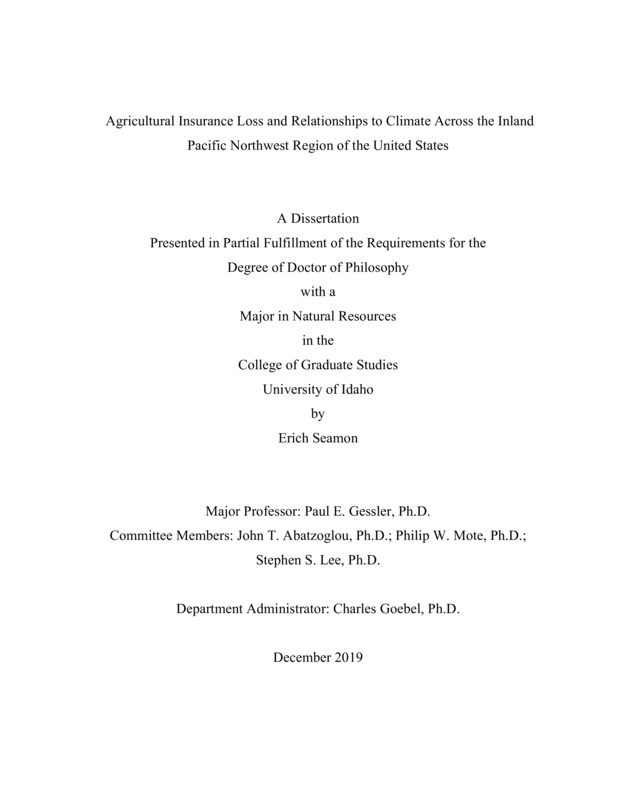Agricultural Insurance Loss and Relationships to Climate Across the Inland Pacific Northwest Region of the United States
Seamon, David Erich. (2019-12). Agricultural Insurance Loss and Relationships to Climate Across the Inland Pacific Northwest Region of the United States. Theses and Dissertations Collection, University of Idaho Library Digital Collections. https://www.lib.uidaho.edu/digital/etd/items/seamon_idaho_0089e_11701.html
- Title:
- Agricultural Insurance Loss and Relationships to Climate Across the Inland Pacific Northwest Region of the United States
- Author:
- Seamon, David Erich
- ORCID:
- 0000-0003-2073-4346
- Date:
- 2019-12
- Keywords:
- agriculture climate change insurance machine learning modeling reproducibility
- Program:
- Natural Resources
- Subject Category:
- Agriculture; Climate change; Statistics
- Abstract:
-
Agricultural crop insurance is an important component for mitigating farm risk, particularly given the potential for unexpected climatic events (Christiansen et al., 1975; Diskin, 1997; Miranda & Glauber, 1997). Using a 2.8 million insurance claim dataset from the United States Department of Agriculture (USDA), this research study examined spatiotemporal variations of agricultural insurance loss across the 24-county region of the inland Pacific Northwest (iPNW) portion of the United States, from 2001 to 2015. For the prescribed time period, wheat was a dominant crop for the region, accounting for over $1.4 billion in insurance losses, with over $700 million resulting in claims due to drought. Principal components analysis showed distinct spatial and temporal differentiations in wheat insurance losses using the range of damage causes as factor loadings, with PC1 and PC2 accounting for 75% of total variance. Of particular note were the orthogonal relationships of county-level water availability damage causes (e.g. drought and heat vs. excessive moisture and cold wet winters), which aligned with regional climatic patterns. While both 2009 and 2015 were peak years for wheat/drought insurance loss, 2015 was the only year of the two that actually experienced regional drought conditions. Given the 2008/2009 recession economic impacts (Fan et al., 2015), this comparison may indicate the unique interaction of climate and economics and their impacts on climatically based damage cause insurance filings.
Extending this iPNW analysis to evaluate quantitative climatic relationships to insurance loss, we developed a design matrix methodology to identify optimum temporal windows for climate variables by county, in relationship to wheat insurance loss due to drought. The results of our temporal window construction for water availability variables (precipitation, temperature, evapotranspiration, Palmer Drought Severity Index (PDSI)) identified spatial patterns across the study area that aligned with regional climate patterns, particularly with regards to drought-prone counties of eastern Washington. Using these optimum time-lagged correlational relationships between insurance loss and individual climate variables, along with commodity pricing, we constructed a regression-based random forest model for insurance loss prediction, as well as to evaluate climatic feature importance. Our cross validated model results indicated that PDSI was the most important factor in predicting total seasonal wheat/drought insurance loss, with wheat pricing and potential evapotranspiration having noted contributions. Our overall regional model had a R2 of .45, and a RMSE of ~$8.1 million. Model performance typically underestimated annual losses, with moderate spatial variability in terms of performance between counties.
Supporting our quantitative analysis of insurance loss and climate, we additionally constructed an open science-based framework for reproducibility (Flathers & Gessler, 2018; Fan et al., 2015; Dumontier & Wesley, 2018), applying our agricultural insurance loss and climate analysis as a case study example. Our case study framework implementation, which provided a set of dynamic analytics dashboards, code outputs, and reproducible research notebooks, identified several challenges that are critical for collaborative data intensive research, including: issues of data scaling, the importance of modular analytic code development, the challenges of team collaboration, data access and transformation and the difficulties regarding climatically gridded data, as well as institutional support for long term data resilience and viability.
- Description:
- doctoral, Ph.D., Natural Resources -- University of Idaho - College of Graduate Studies, 2019-12
- Major Professor:
- Gessler, Paul E
- Committee:
- Abatzoglou, John T; Mote, Philip W; Lee, Stephen S
- Defense Date:
- 2019-12
- Identifier:
- Seamon_idaho_0089E_11701
- Type:
- Text
- Format Original:
- Format:
- application/pdf
- Rights:
- In Copyright - Educational Use Permitted. For more information, please contact University of Idaho Library Special Collections and Archives Department at libspec@uidaho.edu.
- Standardized Rights:
- http://rightsstatements.org/vocab/InC-EDU/1.0/

